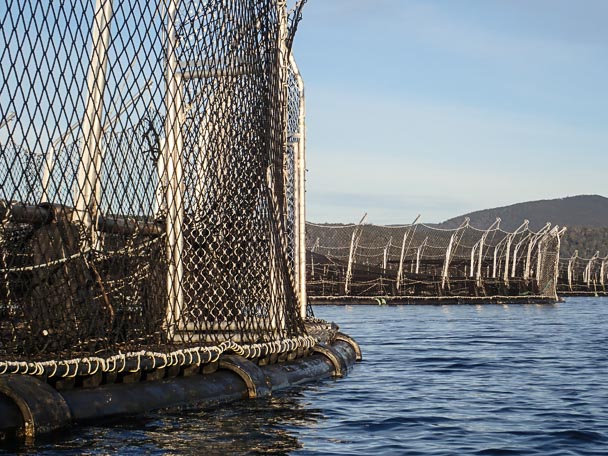As global investors eye land-based salmon farms, the Tasmanian government pushes offshore development

The Tasmanian government is pushing ahead with legal changes to open the door for offshore salmon farms in Commonwealth waters as investors increasingly say they are only interested in land-based fish farming projects.
A senior executive from DNV Maritime, a Norwegian-headquartered multinational that advises the global salmon farming industry, told a recent Australian event that major investors now wanted to back land-based developments. Mining billionaire Andrew Forrest has announced Tattarang, his family company, is investigating a $100 million land-based fish farming project.
It came as the government is proposing changes focused on moving fish farming into Commonwealth waters, having recently unveiled proposed amendments that would enable the federally funded Blue Economy Cooperative Research Centre (CRC) to conduct research into offshore industries.
Per Arild Aland, the business development manager for DNV Maritime told a recent Blue Economy CRC webinar that investors are looking to back land-based projects.
“If you ask some of the financial institutions they say ‘you know, land-based is where we will put our money’,” he said.
DNV is an official partner of the Blue Economy CRC along with Tasmania’s three salmon companies, Tassal, Petuna, and Huon Aquaculture.
While Atlantic Sapphire, the world’s largest land-based fish farmer, has experienced financial problems with its operations in Denmark and the US, Aland said there was a significant advantage for producers that were located near the market they were selling into.
“Any open water expansion technology is at risk of becoming a stranded asset." Environment Tasmania’s campaigner, Jilly Middleton.
Forrest last week said Tattarang was considering a land-based firm farming development at a yet-to-be-determined location.
Tattarang had been a major shareholder in Huon Aquaculture until late last week when it backed a resolution selling the company to the controversial Brazilian company JBS.
Forrest said in a media statement his decision to invest in Huon had been designed “to bring the true impacts of nearshore farming to policy makers’ attention” - a reference to environmental damage caused by Tasmania’s existing salmon farms. He said he also wanted to highlight the need to change animal welfare practices and certification standards.
Forrest’s announcement of a possible land-based project was cautiously welcomed by groups campaigning against existing salmon industry practices. Peter George, the co-chair of the Tasmanian Alliance for Marine Protection, said it was a potentially “game-changing development”.
If Forrest’s project proceeded, George said it would result in competition between land-based and marine salmon. He described it as consumers being able to choose between “clean, green farmed fish or dirty Tasmanian salmon”.
An uncertain role for the public in offshore projects
While Forrest’s plan for land-based fish farming is in its early stages, the Tasmanian government is pushing ahead with proposed changes to the Living Marine Resources Management Act 1995 to allow offshore projects.
Under the proposed amendments, the Minister for Primary Industries, Guy Barnett, would be required to consult the head of the Environment Protection Authority and include any conditions considered necessary for an offshore fish farming research project to go ahead in Commonwealth waters.
The government says it expects any business applying for a permit to conduct “appropriate stakeholder consultation”. Under the existing legislation, the minister is required only to consult “relevant fishing bodies” before granting a permit.
Community groups opposed to the existing salmon farming regulations expressed alarm at the amendments.
“The proposed legislation is an open invitation to the industry to do private deals with the ever-compliant minister, Guy Barnett, who has only to consult with environmental authorities before doing just what the industry wants,” George said.
“Once again, the government wants to give an appearance of listening to public concerns while ignoring them entirely.”
Barnett said research would “initially” be done by the Blue Economy CRC.
The supporting notes to the proposed legislative changes state research aquaculture projects outside Tasmania's three nautical mile zone would be “fixed-term, limited-scale activities” but provide no details on the approximate location.
The notes also state the area involved could be a “defined research zone”. How large the zone could be is not yet clear.
Dr John Wittington, chief executive of the CRC, said the specific details of the research - the “scale, location and activity” - would be developed after analysis of baseline data collected in Bass Strait this year. He said details of the research will depend on what is permitted under the arrangements currently being developed by the Australian and Tasmanian governments for projects in Commonwealth waters.
Any permits for aquaculture research would be issued under the Animal Welfare Act and not be subject to legal review by the public. Only the applicant can appeal against a decision by the minister to refuse, cancel or impose conditions on a permit.
The government says a permit for the research project would include conditions covering “wildlife interactions” and environmental issues.
Environment Tasmania’s campaigner, Jilly Middleton, said she was concerned about the proposed move into offshore waters.
“Any open water expansion technology is at risk of becoming a stranded asset. Our waters are warming at three times the global average, and even the current water temperatures are high enough to drive fish health problems and mortalities,” she said.
Public comment on the proposed changes closes just before midnight on November 3.
 @BobBurtonoz
@BobBurtonoz